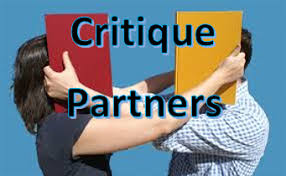 I’ve talked about critiques and critique partners in the past. If you are a new writer or want to be an author, it is important to have others review your work. Not just for the feel-good effect, but for honesty and constructive criticism.
I’ve talked about critiques and critique partners in the past. If you are a new writer or want to be an author, it is important to have others review your work. Not just for the feel-good effect, but for honesty and constructive criticism.
We don’t always see our mistakes, and as a new writer, you probably don’t know a lot of things that a been around the block a few times writer knows. You are going to make the common mistakes that most newbies make.
One of the issues I ran into was finding critique partners. I have great friends but none of them are writers. Sure they could and were willing to read my work, and I had a few do just that. What they were able to do was comment on my premise and point out plot holes and areas of confusion.
What they weren’t able to do, was say hey, you have POV inconsistencies, dragging dialogue, pacing issues, info dumps…… They knew something wasn’t quite right, but they couldn’t identify the problems.
Another issue you run into is friends and family who want to encourage you and not hurt your feelings. They will tell you your work is great, even when it is lacking and you have broken every rule in the book.
So where do you go to find a true critique partner who isn’t afraid to hurt your feelings and knows what they’re looking for? I use scribophile.com. I enjoy the site. They have many published and unpublished authors working together to help each other prepare their work for publication. You do critiques for others and they critique your work. While it’s a large community, you will more than likely develop a following of two or three people who show an interest in what you are doing and follow you through to completion.
There are other sites out there, but I can’t speak for them as I have not joined their groups. You may also find critique partners in your area through organizations like Romance Writers of America, or Christian Romance Writers of America. Have you checked at your local library? Have you tried googling critique groups in your area, or online?
One caution I would offer. Remember it’s your story, a critique partner should help you catch mistakes, improve your writing, and may occasionally make suggestions, but they should not be writing your story for you. If they are trying to change your work into something it wasn’t meant to be, you are probably working with the wrong person.
Something else to think about.
-Jan R
 If you want your reader to continue reading, you have to give them a reason why. Draw them in and keep them guessing. The number one weapon in your arsenal to accomplish this feat is the use of suspense.
If you want your reader to continue reading, you have to give them a reason why. Draw them in and keep them guessing. The number one weapon in your arsenal to accomplish this feat is the use of suspense. If you want to draw your reader in, you have to figure out a way to get them to empathize with the main character in your novel. They have to connect. Help them to see and feel what your character is going through.
If you want to draw your reader in, you have to figure out a way to get them to empathize with the main character in your novel. They have to connect. Help them to see and feel what your character is going through. Have you thought about what tense you will be writing your story in? To be honest, I never thought about tense from that perspective. I knew the tense in my sentences had to be in agreement, and I made sure I was producing grammatically correct prose, but I never thought about the entire novel being written in a specific tense.
Have you thought about what tense you will be writing your story in? To be honest, I never thought about tense from that perspective. I knew the tense in my sentences had to be in agreement, and I made sure I was producing grammatically correct prose, but I never thought about the entire novel being written in a specific tense. Your novel is made up of outer conflict and inner conflict. The outer conflict is what we observe. It’s the plot, the incidents inciting action and moving our story forward.
Your novel is made up of outer conflict and inner conflict. The outer conflict is what we observe. It’s the plot, the incidents inciting action and moving our story forward. Have you thought about the point of view you will be using when you write your novel? Whose head will you be in?
Have you thought about the point of view you will be using when you write your novel? Whose head will you be in? I’ve shared this blog before, but it’s been a while, and a message I think needs to be heard. As new writers, we sometimes listen to everybody but ourselves. Our friends and critique partners mean well, but if you let them, some will try to take over your novel and mold it into what they think it should be.
I’ve shared this blog before, but it’s been a while, and a message I think needs to be heard. As new writers, we sometimes listen to everybody but ourselves. Our friends and critique partners mean well, but if you let them, some will try to take over your novel and mold it into what they think it should be. Your protagonist is the most important character in the novel. He/she will be in every moment, even if not in every scene.
Your protagonist is the most important character in the novel. He/she will be in every moment, even if not in every scene. There are four main dramatic elements to your novel. You probably never thought about it, but if you did it right, they are there. If they’re missing, you need to revisit your work and make some adjustments.
There are four main dramatic elements to your novel. You probably never thought about it, but if you did it right, they are there. If they’re missing, you need to revisit your work and make some adjustments.